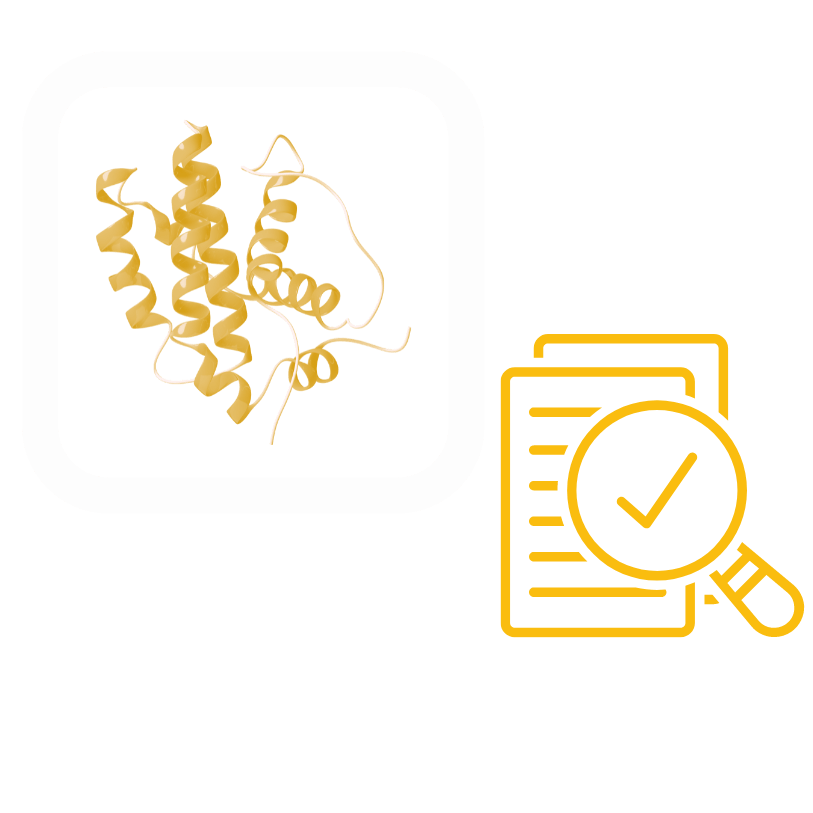Dry lab as a service:
xyna.bio
The most powerful tool in bioscience is you— we’re here to accelerate your work. We enable seamless computational automation, integrating AI-driven models, intuitive pipelines, and scalable data analysis, empowering your discovery and innovation. All without one line of code.
Easy & intuitive:
Cut to your needs
Xyna.bio is a modular, all-in-one ecosystem that takes you from raw data to analysis and visualization without the need for code. Each tool is represented as a node in a dynamic graph interface, allowing you to visually design pipelines with simple drag-and-drop connections. This intuitive structure makes complex analysis transparent, flexible, and scalable.
You can create and share your own pipelines or choose from a collection of pre-built workflows developed and tested by our team—ready to use and easy to adapt to your specific needs.
If you’re looking to automate your workflow but need something beyond our existing tools, our team offers personalized consulting and can build custom pipelines tailored to your needs.

Select what you need
Select nodes from our toolbox or integrate new ones for your analysis

Connect what you got
Design your analysis pipeline by connecting individual tool nodes

Get what you want
Directly view results, plots and export your documentation

Share your work
Collaborate with others by sharing your pipelines, or...
Choose from existing pipelinesPublications & Case Studies
Video
Design More Stable Nanobodies: Full Walkthrough of xyna.bio’s Aggregation Pipeline
Watch our walkthrough video for the Nanobody Aggregation Score Pipeline!
In this demo, we show how to predict VHH aggregation risk using our pipeline developed together with Prof. Dr. Harald Kolmar’s group at TU Darmstadt and Felix Geyer.
If you want to watch embedded videos on this page, personal data (IP address) will be sent to the operator of the video portal (here youtube.com) and cookies will be set on your device. Therefore, it is possible that the video provider stores your accesses and can analyze your behavior. By clicking on "PLAY VIDEO" you consent to the data processing and the setting of cookies.
For more information on data protection, click here: Data Protection
Play VideoBreaking News:
iGEM 2025 in Paris: Our Highlights From an Inspiring Grand Jamboree
This year, the iGEM Grand Jamboree returned to Paris, and so did we. From 28–31 October, the Paris Convention Centre became a global hub of synthetic biology, and we were thrilled to be right in the middle of it all. A Community That Thinks Beyond Boundaries Throughout the week, we had the chance to speak with teams from every corner of the world - discussing ideas, learning about emerging challenges, and exploring how AI and synthetic biology can unlock new possibilities. Our Talk: “Smart Models Think Like Scientists” One of our key moments this year was our presentation on the Technology Stage, where our Scientific Officer, Wiktoria Palka, explored a big question: How do we build AI that truly advances discovery?In her talk, Wiktoria challenged the limits of black-box AI and highlighted the need for a more grounded approach to scientific modeling. With scarce, noisy, and heterogeneous datasets—especially in protein design—purely statistical models fall short. The future, as she explained, lies in hybrid modeling: Using machine learning to generate diverse hypotheses Constraining and testing them with physics-based models such as Molecular Dynamics Closing the loop with experiments to enable justifiable, reproducible decisions At xyna.bio, we’re already building toward this future through our hybrid GROMACS-based MD environment—and this is just the beginning. Our vision is a world where AI becomes a true research partner, enabling cyclic hypothesis generation and human-in-the-loop discovery. Celebrating Our 2025 Travel Grant Teams Another highlight was cheering on the six incredible teams we supported through the xyna.bio Travel Grant Program. Their performance at the Jamboree left us genuinely inspired. Across the six teams, they achieved: 🏅 2× Top 10 placements 🏅 6 medals 🏆 Safety & Security Award 🏆 Best Hardware Award 🏆 Best Fashion & Cosmetics Project …along with numerous nominations and recognitions. Paris treated us wonderfully once again. The conversations, presentations, and spontaneous idea-sharing sessions reminded us why the iGEM community is so special. Until next year—let’s keep building the future of bioscience together. 💚
Read moreSunday, November 2, 2025More latest articles:
First Publication – We are expanding into Nanobody Engineering
Our collaboration with Prof. Dr. Harald Kolmar's research group at Technische Universität Darmstadt together with Felix Geyer has resulted in a publication in Antibodies MDPI showing an innovative advancement in nanobody engineering, by combing ML-based tools and rational design principles: https://doi.org/10.3390/antib14030073 With our part: a free and public nanobody aggregation score pipeline avaliable on the xyna.bio platform. And we are just getting started. Together with TU Darmstadt, we are developing neurosymbolic models that combine domain specific expert knowledge, fine tuned ML-based tools (Boltz2, ProteinGPTs, diffusion models), symbolic AI, with biophysical-chemical-mathematical models in ensemble predictions orchestrated by agents, intelligently controling model combinations, parametrization and more. This milestone demonstrates how interdisciplinary research drives innovation. The future is created where AI, biotechnology, and interdisciplinary excellence converge - here at xyna.bio. A big thank you for this amazing work to Felix Geyer and the entire Kolmar Group, as well as to the whole xyna.bio Team, specifically Wiktoria Palka, Julian Borbeck, Annika Bamberger, Jan Luca Metzler, and the development team led by Sebastian B.!
Read moreMonday, September 8, 2025BFH iGEM Meetup 2025
We’re back at the BFH European Meet-Up 2025! Last year, our AI-powered workshop was one of the most popular — and this year, we’re coming back even stronger. What’s new?An interactive booth where you can explore modular pipeline design with XYNA.BIO, and a hands-on workshop for those ready to dive deep into desgining intuitive bioinformatics workflows. More on the workshop coming soon — stay tuned! A huge shoutout to the iGEM teams from iGEM Bielefeld-CeBiTec, iGEM GU Frankfurt, and iGEM Hamburg for making this gathering possible. Can’t wait to see you all in Frankfurt next week! Stay tuned for more updates, and we can't wait to connect with the brilliant minds of the iGEM community once again!
Read moreMonday, May 12, 2025Mosbacher Kolloquium 2025
We’re gearing up for the Mosbacher Kolloquium 2025! Check out the new xyna.bio version – marking a major step forward in AI-driven molecular design and modeling. The intersection of AI, bioinformatics, and molecular design has never been more exciting. Mosbach is bringing together some of the brightest minds in the field and we can’t wait to share it with the community. Look out for… Martin Steinegger (Seoul National University) - The mastermind behind MMseqs2, ColabFold, and Foldseek, making large-scale protein analysis lightning-fast. Alexander Rives (Evolutionary Scale AI) - Leading the charge with ESMFold & ESM Cambrian, reimagining AI-driven protein structure prediction. Andrea Volkamer (Helmholtz Institute) - Pioneering machine learning-driven drug discovery and virtual screening. …and many more! If you're passionate about computational biology, let’s connect!
Read moreFriday, March 7, 2025Flexible Access for Individuals, Research Teams, and Industry
Choose the Plan That Fits Your Needs
Whether you’re testing our tools for the first time or integrating advanced analytics into your research workflow, we offer flexible options to match your needs. Start free, or collaborate with us for customized, high-performance solutions.
Test the free cloud version
Free Beta
- Instant access to our ready-to-use tool library
- Enjoy cloud-based computation right away
- Experience core features with limited resources
- 5 days of data storage and access
Request consulting
Industry & Research
- Tailored data pipelines built to your specific workflows
- Request custom analytics tools
- Optimized for batch processing and high-throughput performance
- Reliable, secure data handling
- Priority support and direct collaboration with our technical team
Follow us on Social Media
Connection beyond platforms
Community-driven innovation is at the heart of xyna.bio. We shape goals and requirements together with you, ensuring that our platform evolves to meet real research needs. So become part of the xyna.bio community! Follow us on social media for the latest updates, insights, and discussions on the future of computational bioscience.